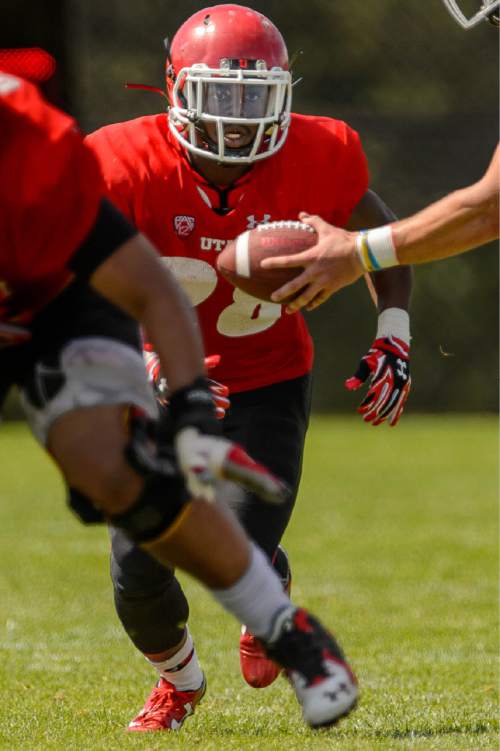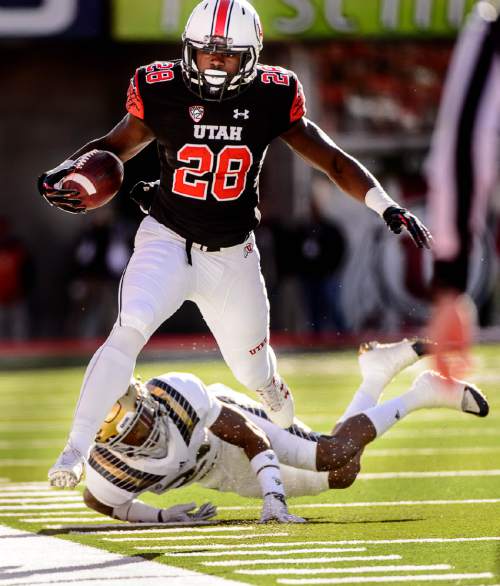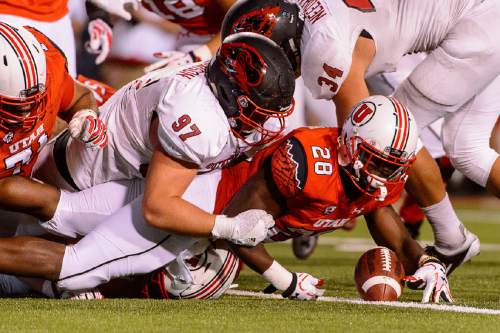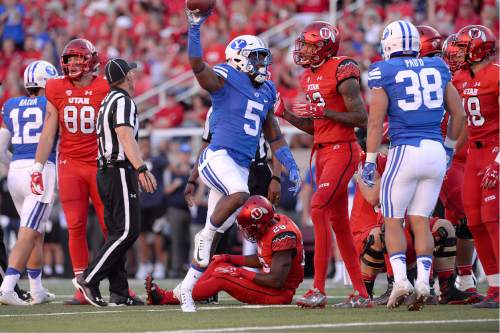This is an archived article that was published on sltrib.com in 2016, and information in the article may be outdated. It is provided only for personal research purposes and may not be reprinted.
Joe Williams said he'd had enough of college football.
And the rest of us were surprised that a running back would walk away from the game, his game, two weeks into his senior season, just like that. Gone. Done. Finished. Looking ahead, not back. Feeling a few gentle tugs, but no great anguish at saying goodbye to a sport he had played and pursued for most of his life.
It's hard to imagine a player doing that.
A human, on the other hand, maybe not.
A 23-year-old whose body hurt, whose mind was elsewhere and whose will deserted him.
He referred, never getting specific, to vague aches and pains, and seemed as though he just flat didn't want to play anymore and so … he wouldn't.
"I'm going to be happy with my decision down the road," he said. "… I've been playing this sport since I was 6 years old. It's caught up with me. I don't want [my health] to be detrimental five years from now. It's in my best interests, and I'm going to be happy about it."
It's a chicken-and-an-egg thing, the recent adversity Williams faced and his sudden exit from Utah football. The running back who entered this season as the frontline option to replace Devontae Booker, having stepped in and blown through a hole for him late last season when Booker was injured, rushing 104 times for 477 yards.
It was now his time to dance this season onto the stage proper and into the spotlight. And, then … and, then … he quite literally dropped the ball and fell off the stage, with the audience loaded into its seats, gasping — or was it growling? — as he landed in the band pit in those two games, getting screamed at by his head coach and benched with all eyes watching. Two days later, he quit, saying it was time to duck on down a back alley to the rest of his life.
"I thought I could fight through it," he said. "It got too overwhelming."
The question remains about the chronology there: Did Williams' desire to leave the game affect his focus — he said he started thinking about the possibility two months ago — and cause him to underperform, or did he underperform, fumble and stumble, get embarrassed, and decide this football deal wasn't any fun? If he'd run for 150 yards per game, scored a couple of touchdowns, would he have checked out the way he did on Tuesday?
Kyle Whittingham said Williams' exit had "nothing to do with playing time, nothing to do with bad feelings, he's leaving on good terms. It was a surprise, in a way, but I could tell something was bothering him."
Nobody outside of Williams' innermost circle knows the veracity of that for sure.
And maybe it doesn't matter.
That's the unseen part, not just of football, rather of all college sports. For scholarship athletes, they pay for an education. But they're hard. They absorb so much time. They interrupt your life. They run and rule your life. They own your life. And sometimes people watching from the stands forget that these athletes aren't gladiators. Their sport doesn't define them, shouldn't define them. It's ironic that a college football player cloaked in his helmet, facemask, pads and uniform is more recognizable to the crowds than he is when he's barefaced, decked out in a T-shirt and jeans.
Williams is scheduled to graduate in December with a degree in sociology. He said he has a "foot in the door" for job opportunities. He's engaged to be married. He consulted his fiancée and other family members in his decision. He said he'd had enough of what the sweat and the turf had brought him.
When Whittingham's head was rotating round and round, his eyeballs popping, angry words his mother told him never to use pouring out of his mouth, all aimed at Williams for one of the fumbles he coughed up in the initial game, the running back looked as though he would rather be just about anywhere else on the planet. He was losing his starting position, something for which he had worked diligently for a long time.
There's no way of knowing the exact expressions disgusted fans had hurled his way — either in person or via social media. And some might be suspicious of and put off by the timing of Williams' departure, given the early troubles he encountered, assuming that a player should be able to take the heat that comes with big-time college football — from coaches and from fans. Some believe quitting is never acceptable.
Williams, apparently, doesn't acquiesce to what others believe.
It's his life. He just wants to live it. He wants to focus on the four classes he needs to finish to graduate, focus on his upcoming wedding, and focus on everything that has nothing to do with his rushing average, his 40 time, his ice baths, his playing time, his yards after contact, his fumble rate.
"This is a hard sport," he said.
"I got to be healthy for the longer part of my life," he said.
"I've got a better future looking over me with this decision," he said.
Just last week, then, Joseph Sterling Williams was a Ute running back, a football player, 5-foot-11, 205 pounds.
Now, he's a human being again, ready to move on to whatever comes next — away from a game that everybody on the outside thinks is so glamorous and whose effects he wants to remove from his muscles and joints and psyche and put firmly in his memory banks, from where they will hurt his body, mind and soul no more.
GORDON MONSON hosts "The Big Show" with Spence Checketts weekdays from 3-7 p.m. on 97.5 FM and 1280 AM The Zone. Twitter: @GordonMonson. —
About Joe Williams
• Native of Allentown, Pa.
• Played for UConn, ASA College (Brooklyn. N.Y. ) before coming to Utah
• Rushed for 552 yards and 1 TD during his abbreviated Ute career
• Majoring in sociology









